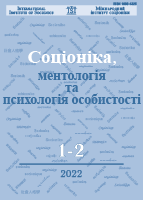Уровни осознания, понимания и использования соционики
Ключевые слова:
соционика, психология, социология, информационная структура психики, модель А, психоинформационное пространство, синхроника, интертипные отношения, межличностные отношения, этносоционика, интегральная соционика, психоинформационная структура этноса, теория систем, психоинформацияАннотация
На основании многолетнего опыта преподавания соционики авторы выделяют и описывают 12 уровней понимания принципов и методов соционики от простой типологии до концепции психоинформационного пространства. Показано, что переход с каждого предыдущего уровня на последующий связан с расширением умений в применении методов соционики в различных областях человеческой деятельности
Библиографические ссылки
Aushra Augustinavichute The Socion. // Socionics, mentology and personality psychology. — 1996. — NN 4–5.
Aushra Augustinavichute Theory of Intertype Relations. // Socionics … — 1997. — NN 1–5.
Aushra Augustinavichute Reinin Theory of Traits. // Socionics… — 1998. — NN 1–6.
Bukalov A.V. Integrated types of collectives, nations, states. Ethnosocionics. // Socionics… — 1998. — N 5. — P. 13–17.
Bukalov A.V. Forming informational metabolism functions in the process of human birth. (Introduction to the Psycho-Analysis Socionics). // Socionics… — 1996. — NN 1–2.
Bukalov A.V. Socionics and psychoinformatics as universal instruments to analysis, structuring and organization of human knowledge. // Socionics… — 2002. — N 3. — P. 5–8.
Bukalov A.V. Socionics, typologies of Jung and Meyers-Briggs: resemblance and difference. // Socionics… — 1998. — N 4. — P. 24–32.
Bukalov A.V. Socionics: humanitarian, social, political and information intellectual technologies of the XXI century. // Socionics… — 2000. — N 1. — P. 5–16.
Bukalov A.V. On dimensionality of informational metabolism functions. // Socionics… — 1995. — N 2. — P. 11–16.
Bukalov A.V. Psychoinformational environment structuring phenomenon: a hierarchy of human attention, memory and thinking volume. // Socionics… — 1999. — N 2. — P. 3–7.
Bukalov A.V. The Jung’s and Reinin’s traits and their discrete distribution in an information metabolism type. // Socionics… — 2001. — N 2. — P. 14–15.
Gulenko V.V. Binary attributes of intertypes relations. // Socionics…— 1996. — N 3. — P. 31–44.
Gulenko V.V. Introvert Socionics. // Socionics… — 1996. — N 4. — P. 27–34.
Gulenko V.V. Quadral values. Psychological roots of social inequality. // Socionics… — 2000. — N 2. — P. 13–27.
Yermak V.D. Structure and functioning psyche of person from the system point of view. // Socionics… — 1996. — N 3. — P. 72–79.
Filimonov A.V. Expansion of information model of mentality. // Socionics… — 1996. — N 6. — P. 63–78.
Churyumov S.I. Two approaches towards formal description of socionic-based relations. // Socionics… — 1999. — NN 3–5.
Churyumov S.I. Socionics and philosophy, or the world never changes. // Socionics… — 1998. — NN 1–3.
Shulman G.A. Model of Socion. // Management and personnel: psychology of management, socionics and sociology. — 2003. — N 2. — P. 49–59.
Shulman G.A. Relations between null and higher planes. // Socionics… — 1997. — N 3. — P. 44–49.




